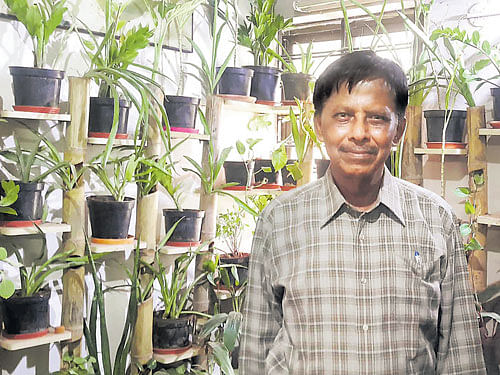
Environmentalist M B Nirmal stays in a high-rise apartment in Koyambedu, which has been declared one of the most polluted areas in Chennai by the State Pollution Control Board.
The tag did not deter him. Evironmentalist in him spurred him to take up some green activity in his apartment. The result: he has more than 1,700 plants, including bamboo shoots and vegetable and medicinal plants. These give his house a garden look.
Exnora founder Nirmal has nurtured thousands of plants in his 12th floor apartment. “Garden can be created everywhere, including your home store room or even in the balcony,” Nirmal says. Except his bedroom and a small portion of his kitchen, the entire space, including veranda and terrace, have plants. “Since plant produces more oxygen, it is better to avoid that in your bedroom,” he says.
“When I came to this apartment, neighbours initially challenged that plants will not grow as the place has high levels of pollution. However, I proved them that plants can be grown anywhere provided there is good sunlight,” 74-year-old Nirmal, who started his house gardening a few years back, said.
In his house, one can find plants in handmade jar carved out of thermocol, flowers in wooden bowls and freshly planted crotons in pots. Nirmal also uses bamboo poles for planting. “Bamboo can be horizontally placed from a rod fixed to the wall. Now the poles can be filled with soil and with that we can grow small flowering plants in them,” he said. His living room too has plenty of plants, including those with medicinal properties. “My living room is an oxygen parlour for me,” he said.
“Gardens help to cool the house,” he claimed. Nirmal's garden venture could be classified into earthen pot garden, pipe garden, tray garden, bag garden, drum garden and tyre garden. Even canvas shoes could be seen filled with mud and saplings in them.
According to him, sufficient sunlight and tailor-made space are necessary to start garden at home. “Keep the plants near windows or in the balcony where some sunlight will fall on the plants during the course of the day, particularly in the morning or in the evening,” he said.
Right plants
However, he said that there are some plants that can grow even in shade. “Handsome hosta will grow in shade areas,” he said adding a few others need just little sunlight. “Right plants have to be picked for the right spots,” he said. “For example shrubs or hedge plants should be planted on both sides of the entrance of the house,” he added.
Nirmal said if sufficient sunlight is not entering the house, “most of the potted plants have to be kept outside (terrace).”
Highlighting the benefits of the terrace garden, Nirmal said it will keep the house cool. “The electricity consumed for operating a fan and an air-conditioner will be reduced. It will also calm you down”, he claimed. “Whenever I see my terrace garden, my mind becomes calm,” Nirmal said. Besides decorative plants, he has grown vegetables such as brinjal, lady’s finger, tomatoes, chillies, greens and radish on his balcony.
The environmentalist claimed that his flat is zero water waste flat. “Even the water we use to wash our rice and vegetables go into the plants, because they are full of nutrients,” he said. “We also prepare our own organic fertiliser to feed the plants.” For Nirmal, water is the most precious commodity and the second basic necessity after air. “It should not be wasted and plants do not ask you for potable water,” he said.
Advising people to use sky space even if they live in a small apartment, he said that waste milk trays, which can he hanged, can be transformed into plant growing area. “Disposable tyres can be stacked up to hold enough soil to grow plants,” he said. Nirmal's 900 sq ft sky farm has over 50 medicinal plants, which he calls “green pharmacy”.
“We want people, especially youngsters to know that techniques like these exist and implement them in their houses,” he said. More than 200 houses in the city have already taken up the activity.
“People from other states too have evinced interest in doing this,” he claimed. On the advantages of sky gardening, he said people will tend to use the kitchen waste for compost and slowly sewage treatment will also be brought about for water supply. Nirmal's another advice is that greening the outside walls and compound will serve as a barrier against dust and polluted air.
Now, Nirmal's garden has turned into a small tourist spot with students from various schools visiting every day. “Young students are very much interested in knowing about each and every plant. They are spending almost two to three hours during their visit,” he said.
Exnora, which was founded by Nirmal, is a broad-based non-governmental organisation focusing on mobilising and empowering communities to participate in preserving nature and preventing environmental degradation, thereby improving the quality of life.
The 16-year-old movement has spread and covered many parts of India. There are about 5,000 such Civic Exnoras in Chennai city and in the various Districts of Tamil Nadu, Andhra Pradesh, Karnataka and Kerala and a few other states, covering about 30,000 streets and settlements.